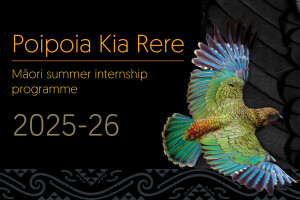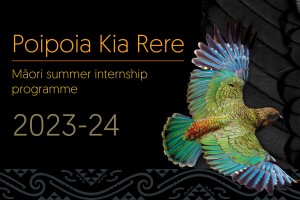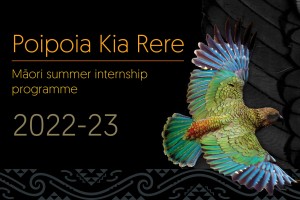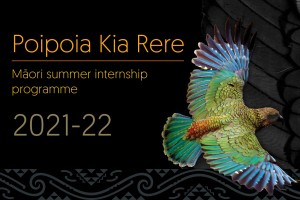Māori Summer Internships 2025-26
In this section
Poipoia kia rere – helping the fledgling to fly
These internships are open to undergraduate or postgraduate tauira Māori at University or Wānanga looking to grow their skills and career pathways in scientific research. Internships provide opportunities to work on a project within a wide range of sciences, including Māori-centred and Kaupapa Māori aligned projects, to support delivery of research for our land and our future.
The internships are for 25 hours per week and will begin in November and end early in February, with a two-week shut down over the Christmas period.
Plant-herbivore interactions in the pā harakeke
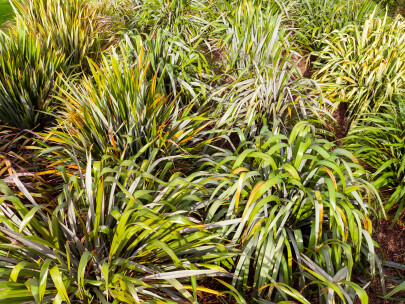 Quantify and understand variation in plant-herbivore interactions in the Lincoln pā harakeke
Quantify and understand variation in plant-herbivore interactions in the Lincoln pā harakeke
Location: Mangōnui | Lincoln, Canterbury
Harakeke (Phormium tenax) and wharariki (Phormium cookianum) host a great diversity of insects, some of which can inflict considerable damage to the plant and impact the quality and quantity of leaf material available for weaving. Sap-feeding scale insects and leaf-chewing caterpillars are two of the most common herbivores, and both are present in the Lincoln pā harakeke, where their infestation levels differ markedly among individual plants. This variability in plant-herbivore interactions has never been quantified and its underlying genetic and environmental drivers are largely unknown.
To address these questions, the tauira will design and conduct a survey to quantify plant-herbivore interactions on plants in the Lincoln pā harakeke. The strength of these interactions will then be assessed against a range of potential explanatory variables, such as plant provenance (e.g., source latitude, region), age, size, phylogeny, location in the pā harakeke, presence of leaf litter, leaf toughness, and other traits. Quantifying and seeking to better understand variability in plant-herbivore interactions will help identify harakeke and wharariki populations that are resistant or susceptible to herbivorous insects. This knowledge could ultimately help to inform planting designs for future pā harakeke.
Matauranga Māori & improving Manaaki Whenua library classification systems
 Exploring how the Manaaki Whenua library’s various storage and searching systems can be improved by incorporation of te ao Māori concepts, terminology and classification groupings to ensure accurate and culturally appropriate representation and handling of resources
Exploring how the Manaaki Whenua library’s various storage and searching systems can be improved by incorporation of te ao Māori concepts, terminology and classification groupings to ensure accurate and culturally appropriate representation and handling of resources
Location: Mangōnui | Lincoln, Canterbury
To study implementation in similar organisations e.g. University libraries and recommend a way forward at Manaaki Whenua which could improve our indexing of material, reports, books and journals so that they can be found when searching with terminology and concepts from a te ao Māori perspective.
Sediment and Mahinga Kai
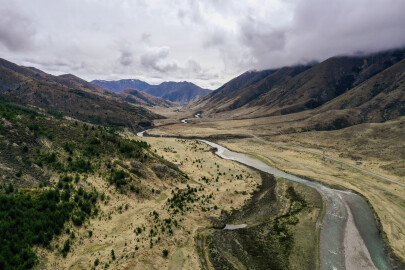 Supporting Rūnanga State of the Takiwā through Interdisciplinary Research
Supporting Rūnanga State of the Takiwā through Interdisciplinary Research
Location: Ōtepoti | Dunedin
This project supports and complements the Hokonui Rūnanga State of the Takiwā assessment by exploring the role of sediment in relation to taonga species and mahinga kai within a key ki uta ki tai scale. The research provides additional information that can be integrated with hapū-led indicators, while offering the student exposure to both mātauranga Māori approaches and scientific tools
In terms of our tauira, the objective is to provide experience to tauira and for future capability building into the research and science sector, especially for working at the interface of mātauranga and science.
There is one core deliverable – the field work of sediment sampling within an existing programme in partnership with Hokonui Rūnanga. Whereas the other components are designed for tauira exposure to field-based, lab-based, and writing based processes relating to environmental health projects that have been co-developed with hapū and papatipu rūnaka. Understanding the entire process from co-creating work with hapū and iwi, to writing, field work, lab work are part of providing exposure to tauira Māori.
Native insect pollinators
 A trait-based approach for predicting conservation status of Aotearoa’s native insect pollinators
A trait-based approach for predicting conservation status of Aotearoa’s native insect pollinators
Location: Mangōnui | Lincoln, Canterbury
The key objectives of this internship are for the tauia Māori to gain hands-on experience working with historical collections of native insect pollinators and to explore research as a potential career path. Through this experience, the tauira will develop skills and competencies relevant to the science sector, particularly in the study of pollinators, which underpin ecosystem function and food production. This experience will enable the tauira to develop knowledge on the changes in native pollinator trends through time and link these changes with species’ traits and environmental change. This knowledge could contribute to filling the gap between the science system and Māori community.

